Private Investors Boycott Stocks, Bernanke Promises Fed Action to Ensure Economic Recovery
Stock-Markets / Financial Markets 2010 Aug 28, 2010 - 06:39 AM GMT U.S. Economy Grew a Revised 1.6% in Second Quarter - (Bloomberg) The U.S. economy grew at a 1.6 percent annual rate in the second quarter, less than previously calculated, as companies reined in inventories and the trade deficit widened.
U.S. Economy Grew a Revised 1.6% in Second Quarter - (Bloomberg) The U.S. economy grew at a 1.6 percent annual rate in the second quarter, less than previously calculated, as companies reined in inventories and the trade deficit widened.
The revised gain in gross domestic product was bigger than the median forecast of economists surveyed by Bloomberg News and compares with a 2.4 percent estimate issued last month, figures from the Commerce Department showed today in Washington. Corporate profits grew last quarter at the slowest rate in a year and employee wages in the prior three months were revised lower.
Bernanke Says Fed Will Do `All It Can' to Ensure U.S. Recovery
(Bloomberg) Federal Reserve Chairman Ben S. Bernanke said the U.S. central bank “will do all that it can” to ensure a continuation of the economic recovery, and outlined steps it might take if the growth slows.
"The Committee is prepared to provide additional monetary accommodation through unconventional measures if it proves necessary, especially if the outlook were to deteriorate significantly,” the Fed chairman said today in opening remarks to central bankers from around the world at the Kansas City Fed’s annual monetary symposium held in Jackson Hole, Wyoming.
ECRI At -9.9% As Downward Historical Prior Revisions Continue
(ZeroHedge) The Economic Cycle Research Institute Weekly came in at an annualized -9.9%, once again straddling the critical -10% boundary. Of course with two previous downward revisions, it appears the index' creators have taken up the government's favorite data fudging ploy of downward revising prior data, as the past week's -10% now ends up being -10.1%
Private investors boycott of equity mutual funds continues.
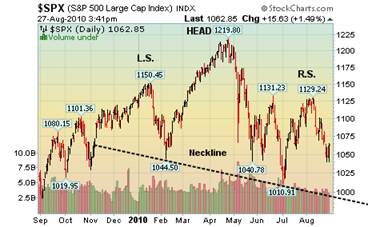 --Investment Company Institute reported that domestic equity (stock) funds reported their 16th sequential outflow last week as $2.706 billion was withdrawn from domestic stock mutual funds. The year-to-date withdrawals total over $50 billion, compared to last year’s -$36 billion. The only buyers seem to be the Primary Dealers, who are receiving Fed liquidity to support the market. The party’s over.
--Investment Company Institute reported that domestic equity (stock) funds reported their 16th sequential outflow last week as $2.706 billion was withdrawn from domestic stock mutual funds. The year-to-date withdrawals total over $50 billion, compared to last year’s -$36 billion. The only buyers seem to be the Primary Dealers, who are receiving Fed liquidity to support the market. The party’s over.
Treasury bonds react badly to Bernanke speech.
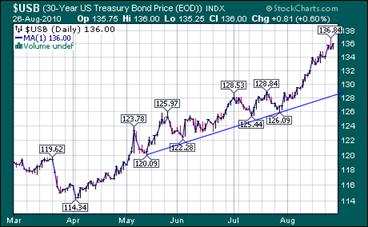 --(MarketWatch) Federal Reserve Board Chairman Ben Bernanke said Friday that the central bank would not sit idly and let the U.S. economy sink into a period of deflation.
--(MarketWatch) Federal Reserve Board Chairman Ben Bernanke said Friday that the central bank would not sit idly and let the U.S. economy sink into a period of deflation.
"The Federal Open Market Committee will strongly resist deviations from price stability in the downward direction," Bernanke said in a speech opening the Fed's annual summer policy retreat.
That means more borrowing and the bond market doesn’t like it.
The Gold rally is getting old.
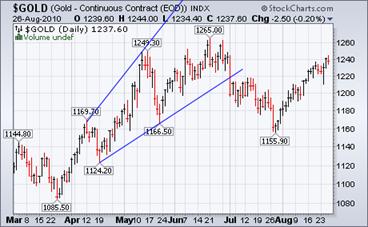 --Gold rose in New York, heading for the fourth straight weekly gain, on speculation that demand for raw materials will increase as the global economy recovers.
--Gold rose in New York, heading for the fourth straight weekly gain, on speculation that demand for raw materials will increase as the global economy recovers.
Gold futures for December delivery rose $4.20, or 0.3 percent, to $1,241.90 an ounce at 9:15 a.m. on the Comex in New York. A close at that price would leave the most-active contract up 1.1 percent this week.
The Nikkei rises in a bear market.
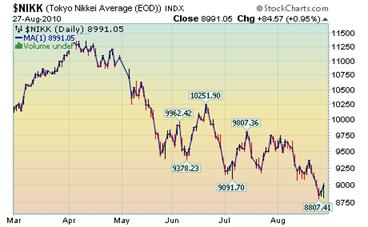 -- Japanese stocks rose, erasing earlier declines, on expectation the government will take measures to halt the yen’s appreciation.
The Nikkei 225 rose 1 percent to 8,991.06 at the 3 p.m. close in Tokyo after falling as much as 1.1 percent. For the week, the Nikkei has dropped 2.1 percent, while the Topix is down 1.2 percent.
-- Japanese stocks rose, erasing earlier declines, on expectation the government will take measures to halt the yen’s appreciation.
The Nikkei 225 rose 1 percent to 8,991.06 at the 3 p.m. close in Tokyo after falling as much as 1.1 percent. For the week, the Nikkei has dropped 2.1 percent, while the Topix is down 1.2 percent.
The Shanghai index breaks its uptrend.
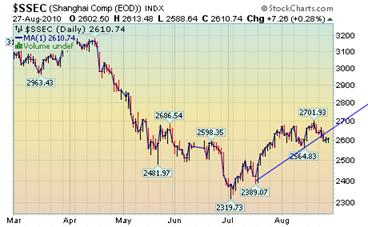 -- China’s stocks rose, paring a weekly loss, as health-care companies and producers of consumer staples gained as investors sought companies more resilient to an economic slowdown.
-- China’s stocks rose, paring a weekly loss, as health-care companies and producers of consumer staples gained as investors sought companies more resilient to an economic slowdown.
The Shanghai Composite Index, which tracks the bigger of China’s stock exchanges, rose 7.26, or 0.3 percent, to 2,610.74 at the 3 p.m. close after swinging between gains and losses. The gauge dropped 1.2 percent this week on signs the global recovery is faltering.
The dollar consolidates gains, prepares for its next move.
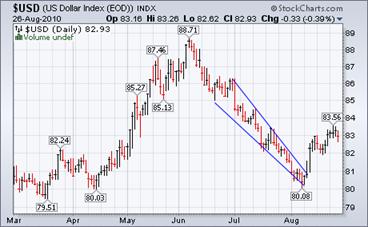 --The dollar rose against the yen after a report showed U.S. economic growth slowed less than forecast in the second quarter.
The battle rages between inflation and deflation as Federal Reserve Chairman Ben S. Bernanke will signal measures to stimulate the economy when he speaks today at a conference. Frankly, Bernanke may be out of ammunition to reinflate.
--The dollar rose against the yen after a report showed U.S. economic growth slowed less than forecast in the second quarter.
The battle rages between inflation and deflation as Federal Reserve Chairman Ben S. Bernanke will signal measures to stimulate the economy when he speaks today at a conference. Frankly, Bernanke may be out of ammunition to reinflate.
Not One New Home Priced Over $750,000 Sold In July
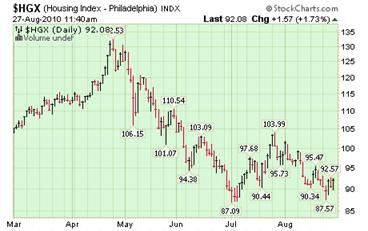 --Once again, the consensus was fooled. It was looking for 330k on new home sales for July and instead they sank to a record low of 276k units at an annual rate. And, just to add insult to injury, June was revised down, to 315k from 330k. Just as resales undercut the 2009 depressed low by 15%, new home sales have done so by 19%. Imagine that even with mortgage rates down 100 basis points in the past year to historic lows, not to mention at least eight different government programs to spur homeownership, home sales have undercut the recession lows by double-digits.
--Once again, the consensus was fooled. It was looking for 330k on new home sales for July and instead they sank to a record low of 276k units at an annual rate. And, just to add insult to injury, June was revised down, to 315k from 330k. Just as resales undercut the 2009 depressed low by 15%, new home sales have done so by 19%. Imagine that even with mortgage rates down 100 basis points in the past year to historic lows, not to mention at least eight different government programs to spur homeownership, home sales have undercut the recession lows by double-digits.
Gasoline prices are still trending down.
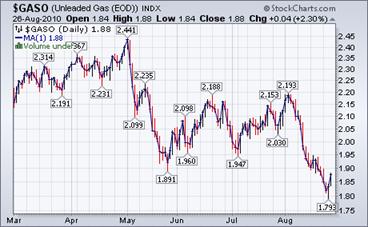 --The Energy Information Agency weekly report observes, “The U.S. average retail price for regular gasoline decreased over four cents to $2.70 per gallon but was 8 cents per gallon higher than this time last year. Prices were down throughout the country except for a slight gain to $2.81 per gallon in the Rocky Mountains…the Midwest recorded the largest price decrease, more than five cents, to settle at $2.63 per gallon.”
--The Energy Information Agency weekly report observes, “The U.S. average retail price for regular gasoline decreased over four cents to $2.70 per gallon but was 8 cents per gallon higher than this time last year. Prices were down throughout the country except for a slight gain to $2.81 per gallon in the Rocky Mountains…the Midwest recorded the largest price decrease, more than five cents, to settle at $2.63 per gallon.”
Natural gas prices match March lows.
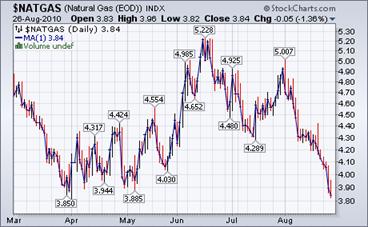 -- The U.S. Energy Information Administration reports, “Natural gas prices fell at the majority of market locations since last Wednesday, as moderating temperatures eased cooling demand for natural gas and domestic natural gas production remained robust. Price declines ranged between 10 and 52 cents per MMBtu at most market locations.”
-- The U.S. Energy Information Administration reports, “Natural gas prices fell at the majority of market locations since last Wednesday, as moderating temperatures eased cooling demand for natural gas and domestic natural gas production remained robust. Price declines ranged between 10 and 52 cents per MMBtu at most market locations.”
Rosie's Observations On The GDP Number, On Bernanke's Address, And On The Market
(ZeroHedge) David Rosenberg has provided his typically succinct summary of the day's heavy dataflow, starting with the GDP number, parsing though Bernanke's speech, and concluding with a broad overview of where the market is heading, which is now so disconnected form a bond-implied FV in the upper 700s it is no longer funny.
GDP BETTER THAN EXPECTED, BUT …
Boy oh boy, 1.6% never felt so good. Bonds are getting hammered and the stock market is surging on a GDP growth number that basically represents stagnation in real per capita terms. But the consensus was looking for 1.4% and the “whispered” number was actually below 1%, so for Mr. Market, at least on a day-to-day basis, it is all about how things do benchmarked against expectations. The data were weak but not a disaster and so we are seeing a temporary bounce in yields and equity prices, which likely won’t last for very long once Q3 GDP estimates grind down from their current 2.5% forecast to something closer to 0% — or even negative — by the time the first report is published at the end of October.
BERNANKE PLAYS THE ROLE OF THE ‘TWO HANDED ECONOMIST’
As wishy-washy as it gets, but in the end, hope won out over despair.
The speech by Fed Chairman Bernanke was all over the map and was noncommittal in terms of offering an iron clad forecast despite the title being The Economic Outlook and Monetary Policy.
The sermon was littered with caveats in the form of “should”, “despite”, “although”, “possibly”, and “however” — but in the end, he expressed optimism (then again, what else can he do in public?). He obviously learned his lesson from using words such as “unusually uncertain”, which he used to describe the economic outlook at his recent Congressional testimony in July when the Dow responded by diving 109 points (as if things haven’t become even more uncertain since, but why tell anyone?).
Nanex Dissects Yesterday's CMT Flash Crash
(ZeroHedge) As readers will recall, yesterday we highlighted the HFT-driven flash crash in Core Molding (CMT) after a (computer) algorithm very obviously went insane and took the stock price to $0.0001 in the span of one second. Today, courtesy of our friends at Nanex, we get a transposition of the events at 14:19 in all their visual glory, together with a succinct explanation of everything that went wrong.
Yes, it is happening to this day and will happen again…on a much larger scale.
Mort Zuckerman: "The Most Fiscally Irresponsible Government in U.S. History"
(ZeroHedge) Two days ago, in Mort Zuckerman Laments "The End Of American Optimism", Takes His Criticism Of Obama To A Whole New Level, we assumed out that Mort's critique of Obama, his policies, and his economic team had reached a level that would likely not be surpassed for a long time. Boy, were we wrong - one short day later Mort comes out with The Most Fiscally Irresponsible Government in U.S. History: Current federal budget trends are capable of destroying this country. "The United States simply seems to lack a system that can fund the government that the people say they want. We are good at crises, but we do not seem to be good at tackling chronic problems. Obama must know that if he doesn't address this, he will be the president who drove us toward a debt crisis. And so too must Congress, for both have now participated in the most fiscally irresponsible government in American history."
Traders alert: The Practical Investor is currently offering the daily Inner Circle Newsletter to new subscribers. Contact us at tpi@thepracticalinvestor.com for a free sample newsletter and subscription information.
Our Investment Advisor Registration is on the Web
We are in the process of updating our website at www.thepracticalinvestor.com to have more information on our services. Log on and click on Advisor Registration to get more details.
If you are a client or wish to become one, please make an appointment to discuss our investment strategies by calling Connie or Tony at (517) 699-1554, ext 10 or 11. Or e-mail us at tpi@thepracticalinvestor.com .
Anthony M. Cherniawski, President and CIO http://www.thepracticalinvestor.com
As a State Registered Investment Advisor, The Practical Investor (TPI) manages private client investment portfolios using a proprietary investment strategy created by Chief Investment Officer Tony Cherniawski. Throughout 2000-01, when many investors felt the pain of double digit market losses, TPI successfully navigated the choppy investment waters, creating a profit for our private investment clients. With a focus on preserving assets and capitalizing on opportunities, TPI clients benefited greatly from the TPI strategies, allowing them to stay on track with their life goals
Disclaimer: The content in this article is written for educational and informational purposes only. There is no offer or recommendation to buy or sell any security and no information contained here should be interpreted or construed as investment advice. Do you own due diligence as the information in this article is the opinion of Anthony M. Cherniawski and subject to change without notice.
Anthony M. Cherniawski Archive |
© 2005-2022 http://www.MarketOracle.co.uk - The Market Oracle is a FREE Daily Financial Markets Analysis & Forecasting online publication.



